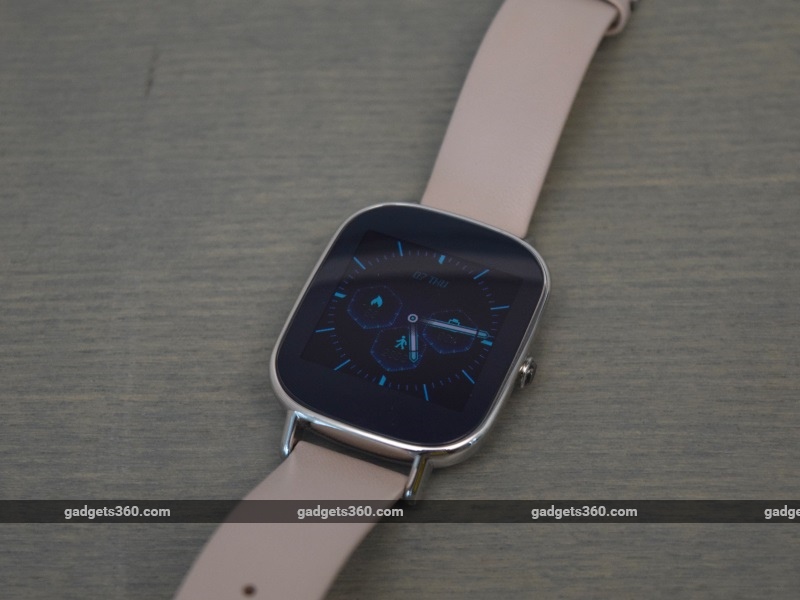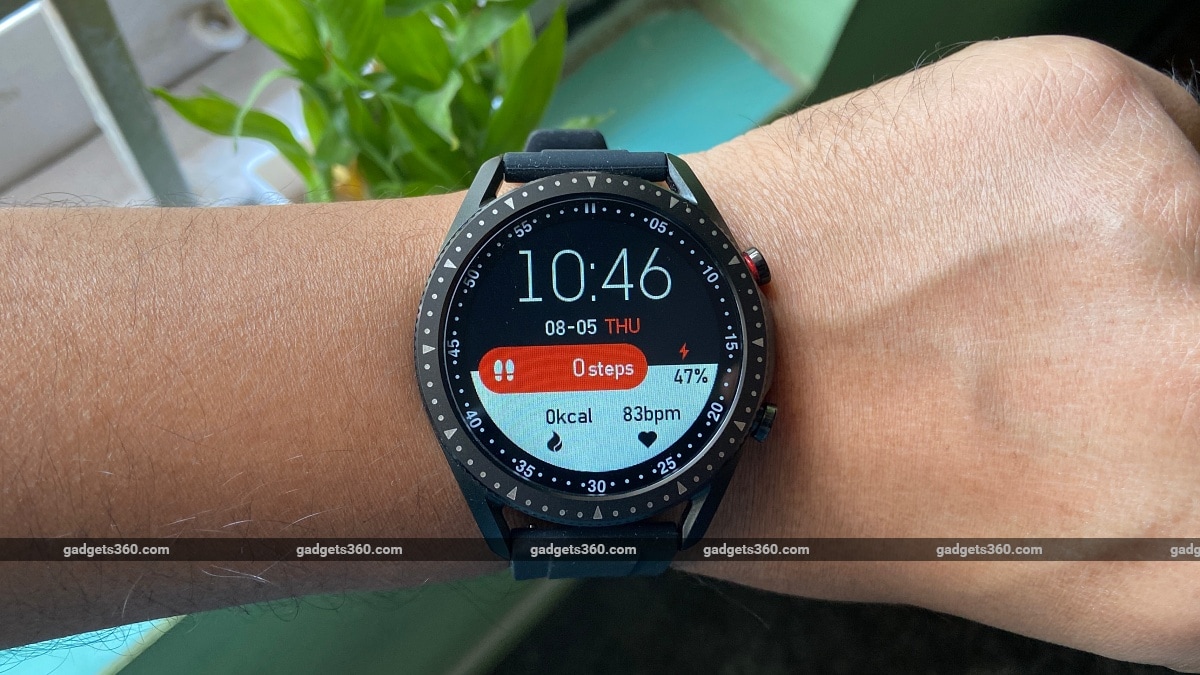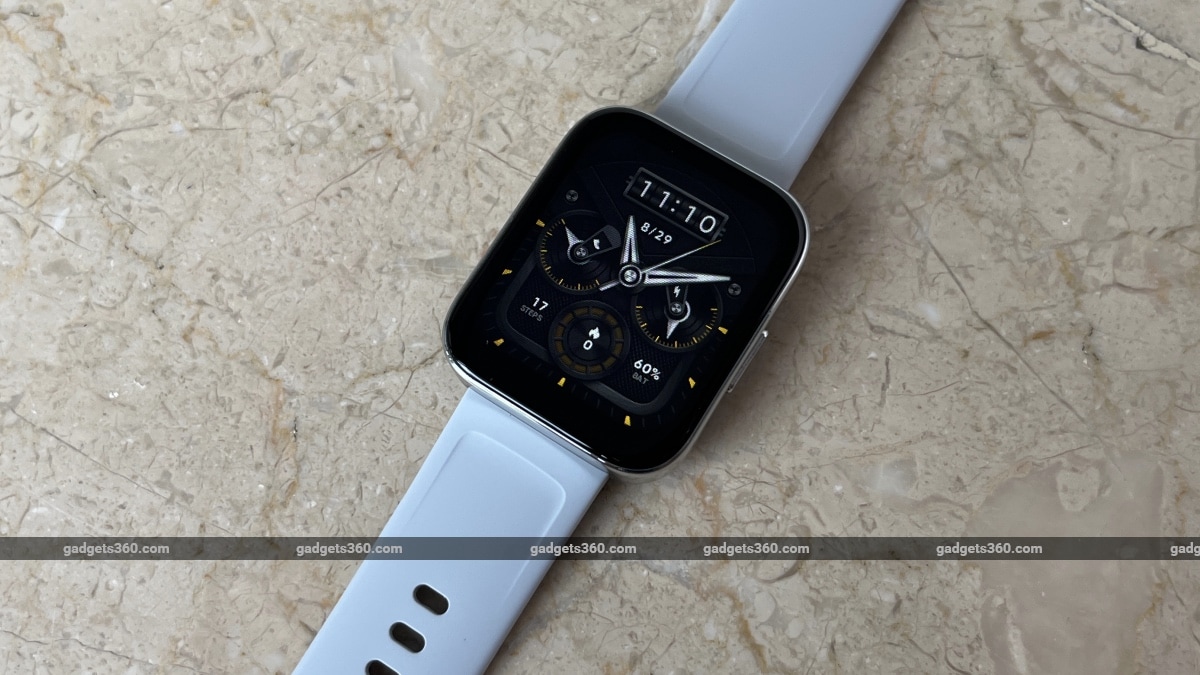Speaking of sequel devices, the Asus ZenWatch 2 recently launched in India at competitive prices. Costing anywhere between Rs. 11,999 and Rs. 14,999 depending on the variant, the Asus ZenWatch 2 marks the Taiwanese company’s presence in the wearables segment in India, considering that the original ZenWatch was never officially launched. It’s the most affordable Android Wear device you can buy, and hopes to entice Android users to give smartwatches a try. Does it have the smarts to give you a superior wearable tech experience? We find out in our review.
Design and display
The Asus ZenWatch 2 pretty much sticks to the design of the original ZenWatch with only a few small differences that set it apart. The biggest of these is the inclusion of a button on the right edge, which now lets you interact with the watch in various ways. Holding down the button for a few seconds will power the watch on or off, while a short press will wake the screen or put in in ambient/sleep mode. A slightly longer press will bring up the menu, but it’s usually easier to just swipe left to achieve this.
Similar to what Motorola did with the Moto 360 (2nd Gen), Asus has launched the ZenWatch 2 in two sizes. The larger W1501Q variant has a 1.63-inch, 320×320 pixel screen with a density of 278ppi, while the smaller W1502Q variant has a 1.45-inch, 280×280 pixel screen with a 273ppi density. There are differences in design between the two variants as well, with the W1501Q having more space between the lugs to accommodate 22mm straps, compared to the 18mm straps that the W1502Q needs. Our review sample was the smaller W1502Q. Both variants have Amoled displays, which are sharp, bright, and detailed.
![]()
As on the previous model, the straps of the ZenWatch 2 are easily replaceable. You can buy the watch with a leather or rubber strap, but even though the watch itself is IP67 water-resistant, we advise keeping leather straps away from water. Although Asus doesn’t explicitly state anything and both watches are clearly being marketed as unisex offerings, we can’t help but feel that the W1501Q was designed more for men, while the W1502Q is targeted more at women, with its narrower straps and what we consider to be a more elegant design.
The W1502Q model sold in India has a smooth silver case with a dark blue surface around the screen. Although it has a rather interesting pattern, we felt the space was wasted and the screen was too small in comparison to the rest of the front. In comparison, the Moto 360 (2nd Gen) is a far better looking smartwatch, thanks to its round face and more watch-like proportions. However, the vast difference in price between the Moto 360 and the ZenWatch 2 means that a lot of people might be willing to overlook this.
![]()
The device measures 10.4mm in thickness, but doesn’t feel particularly bulky on the wrist. The back of the Asus ZenWatch 2 is plastic, with some basic branding and regulatory information printed above the charging contacts. Unfortunately, this looks a bit odd and lacking in uniformity when compared to the reflective silver finish above it.
Charging is a simple affair, with the proprietary cable connecting to a standard USB charger and clamping onto the contacts magnetically. Although charging itself is usually quick and hassle-free, the magnetic clamping mechanism is anything but secure, coming off with very little effort. Charging was halted more than once because of a pet cat, so you will want to ensure that the watch is placed securely when plugged in.
![]()
Specifications and performance
The Android Wear platform does not currently allow manufacturers to design their own user interfaces, and so every device, including the Asus ZenWatch 2, runs stock Android Wear 5.1.1. The interface and settings remain identical to what we’ve seen on other devices. Manufacturers can only add a few apps of their own to offer additional value and to utilise any specific hardware in the device, such as heart rate sensors or pedometers. The ZenWatch 2 has a few such apps pre-installed, including Jawbone’s UP step tracker, an SOS tool, Shazam for music recognition, and a weather app. You can also install the ZenWatch Manager and Wellness apps on your smartphone to control and access data from the device.
![]()
The rest of the device’s features are mostly identical to what we saw on the Moto 360 (2nd Gen). The ZenWatch 2 doesn’t have the heart rate sensor that the Moto 360 offers, and is simpler in that sense thanks to a lack of bells and whistles. The most significant difference though is the abundance of pre-installed watch faces on the ZenWatch 2. There are many excellent options to choose from, a lot of which offer additional information on their faces, such as battery levels for both the watch and paired smartphone, steps taken and calories burned, weather updates, and more. A lot of the faces are great looking as well, with different art and typographical styles to choose from.
In terms of the internal components, nothing has changed going from the original ZenWatch to the ZenWatch 2. The device is powered by a Qualcomm Snapdragon 400 SoC, with 512MB of RAM, 4GB of internal storage, and Bluetooth 4.1. The battery in the W1502Q variant is 300mAh, while the W1501Q variant has a larger 400mAh battery. Our review unit easily went two days on a charge, which is excellent by Android Wear standards. The Asus ZenWatch 2 requires the Android Wear app to run, and works on devices running Android 4.3 or later. Additionally, it’s one of the few such devices that is compatible with iOS, and can be used with select iPhone models.
![]()
Fitness tracking is limited to a pedometer to count steps, and a motion sensor to detect sleep patterns. The software uses data from the pedometer to estimate calories burned, so activity tracking is fairly basic. The ZenWatch Manager app is fantastic, though. It allows you to monitor watch data and customise watch faces with the data you want, as well as switch on or off the peek preview, which allows you to see unseen notifications at a glance even when the watch is in ambient mode. Other settings such as phone controls and SOS contacts can also be configured here.
![]()
As with other Android Wear smartwatches that use the Qualcomm Snapdragon 400 SoC, performance is excellent on the Asus ZenWatch 2. Swiping about the software is effortless, and there’s no noticeable lag or stutter. Opening apps is quick, and the general interface is smooth. The only issue we had was that the watch usually didn’t light up when we flicked our wrists, which meant that we had to tap the screen to activate the watch and read notifications. Apart from this issue with the motion sensors, the Asus ZenWatch 2 is a solid performer.
![]()
Verdict
Although Asus didn’t launch the original ZenWatch in India, the ZenWatch 2 finds its way here and is priced extremely competitively. It’s the most affordable Android Wear smartwatch you can buy in India today, and offers everything that Android Wear is capable of and more. If you’re looking to get into the smartwatch game without breaking the bank, this is the device for you.
It has a good screen, excellent battery life (compared to other Android Wear watches), great performance and quite a lot of customisation and control in the form of a large range of watch faces and an excellent control app. Available in two size options, the watch effectively caters to both genders, and is the value offering that the Android Wear platform desperately needs.
Price (MRP): Rs. 11,999 to Rs. 14,999
Pros
- Good performance and battery life
- Excellent screen
- Plenty of customisation and control options
- Straps can be replaced quickly
- Good pricing
Cons
- Wasted space around the screen
- Issues with motion sensors
Ratings (Out of 5)
- Design: 3.5
- Performance: 4
- Value for money: 4
- Overall: 4


